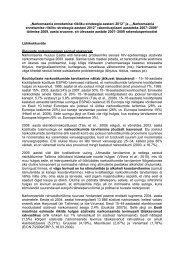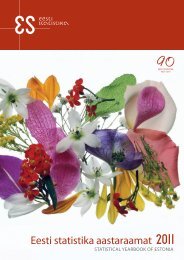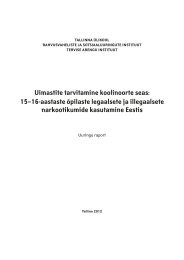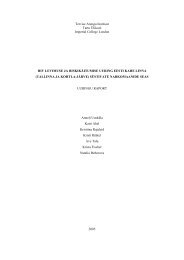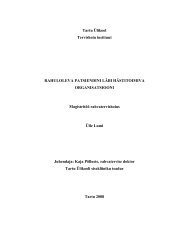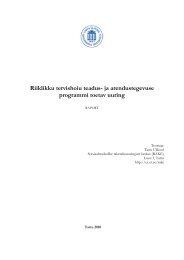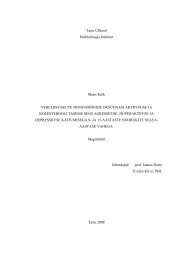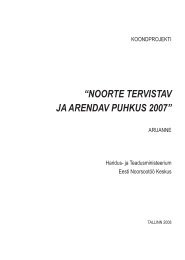MEHE KODU ON MAAILM, NAISE MAAILM ON KODU? - Tartu Ãlikool
MEHE KODU ON MAAILM, NAISE MAAILM ON KODU? - Tartu Ãlikool
MEHE KODU ON MAAILM, NAISE MAAILM ON KODU? - Tartu Ãlikool
Create successful ePaper yourself
Turn your PDF publications into a flip-book with our unique Google optimized e-Paper software.
SOOLISED ERINEVUSED AJAKASUTUSES GENDER DIFFERENCES IN TIME USE<br />
employment. The decrease in the length of household work for each minute of paid work is<br />
greater for women than it is for men.<br />
The results regarding weekends are quite similar. Assuming that other parameters remain<br />
unchanged, women spend 78 minutes more than men on household tasks. The time spent by<br />
men on household care is influenced by the presence of children of pre-school age more at<br />
weekends than on workdays. Such a result could be expected, because a half of the time spent<br />
by men on childcare is spent on social childcare, which is more important at weekends. Every<br />
additional minute spent on employment reduces the time spent on household chores by<br />
0.3 minutes. This correlation is stronger in case of women. However, the time spent on<br />
employment is shorter at weekends and equals zero for the majority of people. (Table 2)<br />
Summary<br />
People’s time use differs by sex at each stage of life. Women spend less time than men on<br />
employment and more time on household and family care. As employment and household work<br />
are still assigned different values, such specialisation creates social and financial consequences<br />
for women. Women pay a price for that in their wages and in available leisure time. Women tend<br />
to have less unoccupied time than men. Even though the gender gap with regard to paid and<br />
unpaid work has decreased over the last ten years, differences in the total committed time have<br />
remained unchanged. Considering the time spent on employment and household care, women’s<br />
total commited time in a day is almost an hour longer than that of men of similar age, labour<br />
status, education and other parameters. In addition, time use is influenced by labour status as<br />
well as by the existence and age of children. Children’s age is especially influential on women’s<br />
total working time and, in particular, the time spent on household and family care – younger<br />
children mean longer working days for women. Women perform more household tasks than men,<br />
even if the amount of time spent on employment is equal. However, the more time people spend<br />
on employment, the less time they have available for household work. One hour of paid work<br />
reduces the time spent on household chores by 18 minutes. The impact of employment on the<br />
time spent on household care is greater in the case of women.<br />
The amount and division of household tasks can be influenced by various employment policies,<br />
such as regulation of working hours or establishment of the length of parental leave and the rules<br />
for granting such leave. If men spend less time on employment, this results in a more even<br />
division of household tasks (McGinnity and Russell 2008). Long periods of time spent on<br />
employment prevent men from being more involved in childcare and household chores.<br />
Measures to achieve greater gender equality at home include, for instance, paid parental leave<br />
and paternity leave as well as more flexible working arrangements in ‘males’ occupations’.<br />
Provision of childcare services by the state may not have a direct impact on inequality in<br />
household work, but it offers women a greater range of options and enables them to spend more<br />
time on employment. It is also likely to reduce the amount of time spent by women on household<br />
tasks. Consequently, strategies that contribute to equality in employment can also reduce<br />
inequality in home life. Reduction of inequality in the time use of women and men is necessary to<br />
change social attitudes to and views on the gender norms and valuation of unpaid work.<br />
<strong>MEHE</strong> <strong>KODU</strong> <strong>ON</strong> <strong>MAAILM</strong>, <strong>NAISE</strong> <strong>MAAILM</strong> <strong>ON</strong> <strong>KODU</strong>? MAN’S HOME IS THE WORLD, WOMAN’S WORLD IS HER HOME? 35



